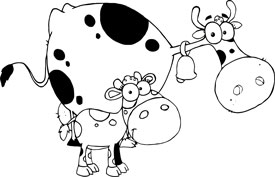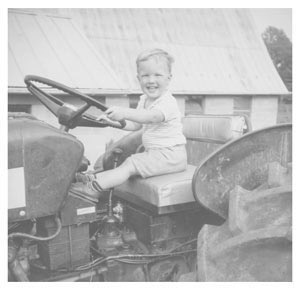There are some experiences you have to live through to understand. Growing up on a farm is one of them. I’m grateful and fortunate that I got to spend the first ten years of my life on a farm. Here are 10 experiences that taught me a lot about bindery work in particular as well as life in general.
 1) I vividly remember the first time I saw a veterinarian examining one of our pregnant cows. My dad and a few other farmers were standing around discussing the problem with the vet. Suddenly the vet’s entire arm disappeared in the cow’s backside and remained there as he checked the position of the soon-to-be-born calf. I was slack-jawed with wonder, shock, and perhaps a bit of nausea.
1) I vividly remember the first time I saw a veterinarian examining one of our pregnant cows. My dad and a few other farmers were standing around discussing the problem with the vet. Suddenly the vet’s entire arm disappeared in the cow’s backside and remained there as he checked the position of the soon-to-be-born calf. I was slack-jawed with wonder, shock, and perhaps a bit of nausea.
The cow finished its labor soon thereafter and all was well with mother and calf. It taught me that when you need a specialist, don’t hesitate to call one. It also confirmed I didn’t want to be a vet.
2) When you look at 20 acres of hay to be baled and brought back to the barn before the growing dark clouds release their rain, you learn not to get overwhelmed. You take it one bale at a time. Years later, when I’d see 20 or 30 skids of printed board waiting for me at the guillotine cutter, I didn’t panic. I worked on one skid at a time, one lift at a time and it always got done.
3) We learned responsibility and a good work ethic early. Our after-school chores included feeding chickens and picking eggs. We didn’t dare skip a chore since animals would get sick or even die if you neglected your duties. Chickens don’t lay as many eggs if they’re hungry, thirsty, hot, frightened, or without the right amount of light.
On a farm the connection to a job poorly done is there for all to see. In printing, I knew the results of a job poorly done were not so self-evident. But they are just as real. Somebody has a bad day when you do a bad job.
4) Life on the farm stimulated creativity. We were surrounded by 99 acres of farmland and forest bordered by a stream with a covered bridge. We were free to explore and play at will, as long as the chores and homework were done. We invented our own games, and built castles out of mud, snow, or hay bales, depending on the season. By any financial standard I’m sure we were poor, but we never knew it or felt it.
If something broke, we had to creatively figure out how to fix it. There was no going to the store to buy what we needed, never mind a replacement. We worked with what we had at hand. I learned how to use pliers, vise grips, screw drivers, a hand saw, wire, and a hammer to do almost anything.
It’s eerily similar to post-press work. How are you going to make the paper do what you want it to do? What if we did this job another way? There is never a day without challenges in print finishing. The trick is to stay creative and explore all the possibilities. And of course, make do with what you have at hand.
 5) I learned how to drive a tractor and truck years before I ever took a driving lesson. I’m not sure that we were supposed to be doing this, but we did. (The photo at right is me on a tractor at 2 years old. My father isn’t in the pic because by then I was probably driving solo.)
5) I learned how to drive a tractor and truck years before I ever took a driving lesson. I’m not sure that we were supposed to be doing this, but we did. (The photo at right is me on a tractor at 2 years old. My father isn’t in the pic because by then I was probably driving solo.)
Working with farm equipment teaches you respect for machinery. Like farm equipment, some bindery equipment is dangerous. But we rely on such equipment to get the job done, so you can’t be afraid of machinery, no matter how big and powerful it is. However, I had seen enough farmers with missing fingers or other injuries to learn respect for any and all equipment. When you use it properly and follow safety precautions you don’t get hurt.
6) I learned the importance of how markets work. My dad wouldn’t invest in planting and harvesting a crop that no one would want in the spring. Whatever you plan to do as an employee or a business person better be of value to someone. If it isn’t, you better figure out how to make yourself more valuable.
Just as the changing seasons affect the market prices of agricultural products, so too the market for our products and services will change. Pay attention to the seasons.
7) We had a tall silo with a ladder going all the way to the top. Of course my brothers convinced me it was a good idea to climb up, check out the view, and report back. It was indeed spectacular but then I had to climb down. Several stories up and hanging out in the breeze on a rickety ladder, the experience taught me to avoid rash decisions. Good advice in any work situation. Oh, and never look down.
8) I learned the art of persuasion. We could always talk our city cousins into touching the electric fence. I’m sure we even talked one into relieving himself on it. If it repels a 1200 pound cow, think what it does to a skinny 100 pound kid. Persuasiveness is a handy skill to have when you need to convince a co-worker to do something they might not like.
9) Mom worked full-time nights as a nurse, came home to get us up for school, made breakfast, took us to school, and then caught a few hours’ sleep. In the afternoon she picked us up at school or the bus stop, made dinner, made sure we did our homework, got us to bed, and then went off to work a full night. For many years my dad worked the farm 7 days a week during the day and then a full time job at nights. Farming was seriously hard and that’s what it took to keep things going. They were tired but I never remember them complaining about work.
This taught me to take action if I wasn’t happy with a situation. No need for complaining or placing blame. Just do something. Pick up your pack and march.
10) One day during our egg-picking chore, one of my brothers pushed my sister into a bushel basket full of eggs. That ruined a big percentage of the days take in eggs. Looking past the anger on my father’s face, I could see the look of distress in his eyes. Every dollar earned was vital, and a careless shove had cost many dollars for the day, dollars we could ill afford to lose.
This taught me the value of a dollar and that the smallest mistakes can be costly. In this related story I tell about how a single bad cut I made on a label job nearly cost a salesman one of his biggest customers. My “minor” mistake had a big impact. It could have cost me my job as a bindery equipment operator and cost the company future revenue.
Running a small farm is a tough way to make a living. It was my father’s dream to own such a farm, but after years of trying to stay afloat, it was sold at auction. It was painful to watch strangers and neighbors haul away everything my parents owned. But even here I learned that when you lose all your material possessions, it’s not the end of the world. Dreams can die but life goes on.
We moved to a small house in a nearby town with new schools, new friends, and more adventures. Now my siblings and I had an entire town to roam freely. Thankfully, the farm had done its duty and instilled in us its unforgettable lessons.
As I write this article and think about farm life, memories keep floating to the surface. For instance, do you know you really shouldn’t name an animal you plan to eat? Food always tastes better on the farm, manure actually smells good, and cows can run faster than I can. But these are stories for another day.
Please feel free to share your comments or farm stories below!


